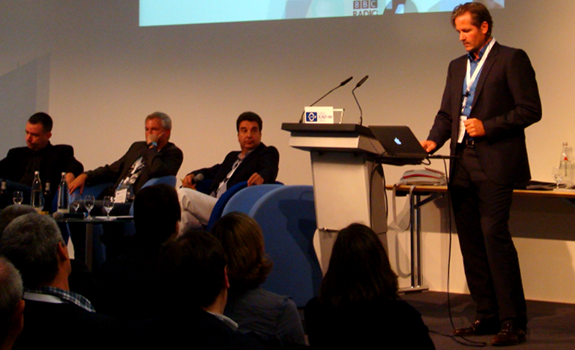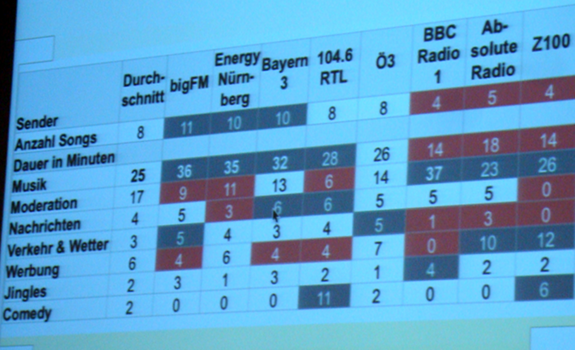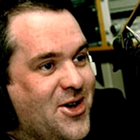Should radio stations just offer music and short breaks? Or do they need personalities that have something to say about interesting topics and give the station its character?
In a session at the Lokalrundfunktage 2011 radio conference in Nürnberg, personality radio was being discussed from the perspective of the German radio market and compared to the United Kingdom and United States radio industry. Still, some of the insights are relevant for any radio market. So I wanted to share the highlights with you here.
Topics
- Top 10 of (German) radio audience dislikes
- How German listeners perceive radio presenters
- Which German morning show airs more comedy than Elvis Duran’s
- How the UK, USA and German radio cultures reflect on-air
- What are the personality radio challenges in Germany
 Engaging personalities, interesting content
Engaging personalities, interesting content
“I don’t know any successful station that only plays music”, says Christoph Pöschl of Brand Support (who has never heard of Sky Radio or is maybe just talking about Germany). Research indicates a demand for personality radio. It seems that radio audiences find (more) engaging personalities and interesting content more important than music, as the first 7 of the 10 most frequently mentioned audience dislikes about German radio are not about music at all.
Top 10 (German) radio audience dislikes
Ten things that German (but maybe all) radio stations should avoid:
- Topics that are not interesting
- Conversations that are not interesting
- Presenters that are talking too much
- Promotions that are not interesting
- Too much commercials by advertisers
- Too much self-promotion by the station
- Presenters that are not personal/emotional
- Not enough music variety
- Not enough music in general
- Too much same song repetition

Christoph Pöschl (standing on the right) shares audience perceptions about radio in Germany (photo: Thomas Giger)
Professional but not very personal
German listeners have the following perception of German radio presenters:
- 85% of them presents solid and professional
- 83% of them has a pleasant radio voice
- 73% of them seems locally established
- 72% of them is a competent presenter
- 70% of them is a likeable person
- 59% of them is authentic
- 56% of them is quick-witted
- 55% of them shares an opinion
Music driven vs. more talk
The researchers monitored morning shows on stations in German speaking markets, such as Hitradio Ö3 and 104.6 RTL. They’ve also listened to UK brands like BBC Radio 1 and Absolute Radio, and to USA giants Z100 and KIIS-FM. Both public and private stations in Germany feature more music than talk. In addition, both play fewer commercials and offer more news & service elements than most private stations in the UK and USA. The following picture shows the numbers for a few stations that were monitored.

Morning show content analysis of radio stations in Germany, Austria, UK and USA, in which the first column shows top-down: the number of songs per hour, and the number of minutes per hour for music, talk, news, traffic & weather, commercials, jingles and comedy – the second column shows the average of all stations (data: Brand Support)
104.6 RTL Berlin
Of the UK and USA stations that were monitored, The Chris Moyles Show on BBC Radio 1 has the most talk (up to 37 minutes an hour). Even Elvis Duran & The Morning Show on Z100 talk ‘just’ 26 minutes. However, BBC Radio 1 doesn’t feature advertising, where Z100 plays up to 12 minutes of commercials an hour. It’s also interesting that 104.6 RTL’s Arno Und Die Morgencrew features by far the most comedy (up to 11 minutes an hour) compared to other morning shows, even to the one of Z100. Next, we’ll have a look at the actual topics that are being discussed on-air.
 British radio: collective experiences
British radio: collective experiences
“English radio personalities are in the listener mode and talk about collective experiences.” British radio jocks ask their listeners things like:
What 6 words describe your weekend?
What do you remember from learning in high school?
What have been the 5 most impressive moments in your life?
American radio: relation issues
“In the USA it’s all about relations. They do bits like the Battle of the Sexes and Dirty Talk – although there are stations in Germany that do this very well, too…” Examples of popular American radio topics:
What do you do with stuff that reminds you of your ex?
Do you care if you make more money than your date?
Which topics do you never discuss with your dad?
 German radio: expertise knowledge
German radio: expertise knowledge
“Presenters in Germany act like experts. They’re instructive and try to avoid any mistake.” Also, German radio shows talk about social issues, such as:
What do you do voluntary and honorary for your community?
Why do we communicate by memos and emails, instead of talking?
Why does my child always need to wear clothes by the hippest brands?
Personality radio challenges
While there is a listener demand for interesting topics and engaging personalities, and it’s evident that these are important for the stationality, personality radio is not a real part of Germany’s radio culture. Finding the personality talents of tomorrow – in a market that has been alledgedly breaking down talented people for years – will be a challenge. In part 2 of this article, radio personalities and a program director from Germany speak about this. They’ll also answer the question: what defines a radio personality?
Read also: What Defines A Radio Personality?





Add Your Comment